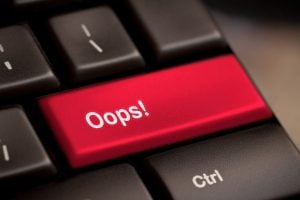Lawyers live in constant fear of details. Superior attention to detail makes lawyers money; a lack of attention to detail makes for malpractice. But, as law practice becomes more and more complex — contracts amass, details proliferate — it becomes more and more difficult to spot those small mistakes that can come back to bite you. Of course, smart lawyers understand that technology is the solution for information overload. Once you’ve figured that out, it’s just a matter of picking the right technology.
If you’re sweating your contract drafting like you’re walking through a field of land mines, Donna offers peace of mind, and protection against those backbiting oversights that keep you up at night.
What Is It?
 Donna is a contract editing software, whose purpose is to provide context and relevant information when you need it in order to spot those easy-to-overlook mistakes. Because, let’s face it, when you’re reading a 50-page contract, it’s not quite as enthralling as “Avengers: Endgame”; so, it’s understandable that your mind might drift, and that you’d overlook an inconsistency or misinterpretation that could that could come back and haunt you. Donna is there to watch your back, to make sure you’re consistently addressing even the most minute variables.
Donna is a contract editing software, whose purpose is to provide context and relevant information when you need it in order to spot those easy-to-overlook mistakes. Because, let’s face it, when you’re reading a 50-page contract, it’s not quite as enthralling as “Avengers: Endgame”; so, it’s understandable that your mind might drift, and that you’d overlook an inconsistency or misinterpretation that could that could come back and haunt you. Donna is there to watch your back, to make sure you’re consistently addressing even the most minute variables.
Donna is a cloud-based product that comes as a convenient Microsoft Word plug-in, available for both premise-based (traditional) versions of Word (like Word 2016 and Word 2013), as well as Word Online. And, because Donna is a plug-in that doesn’t require special permissions, it’s super easy to install. I mean, you could probably install it without even asking your IT person… But, you didn’t hear that from me, okay? So, when you do tell your IT person (you will, won’t you), it’s still just a one-step download.
Once you download Donna for Word, that’s when the magic happens.
What Does it Do?
What magic, you ask? Good question. THIS kind of magic:
 After you’ve downloaded Donna, you’ll find a new Donna button on the far right-hand side of the Microsoft Office ribbon; you toggle Donna off and on by clicking that button. When Donna is turned on, opening any document will automatically set it to work. Donna will bring up potential suggestions and other interesting details, by generating colored highlights in your document. Clicking these highlights opens up matching snippets in the Donna sidebar. For instance, suggestions are highlighted in yellow and clicking them, Donna explains the potential problem discovered. Donna will even link other relevant snippets such as related issues or definitions. Every snippet has a “focus” button that allows you to jump to the exact spot in the document where the Donna highlight exists. Using this information, you can decide to make a change based on Donna’s suggestion, or to skip the suggestion, and optionally any suggestions like it. In this way, Donna becomes your second set of eyes for contract review — eyes that don’t glaze over thinking about the upcoming weekend’s plans — but, it’s ultimately your choice as the lawyer to make or reject changes related to Donna’s operations. Donna of course can’t write the agreement for you, AI lacks something people like to call “common sense”. But Donna isn’t your typical AI, its Assistive Intelligence, because it ultimately leaves the decision making in the capable hands of the lawyer.
After you’ve downloaded Donna, you’ll find a new Donna button on the far right-hand side of the Microsoft Office ribbon; you toggle Donna off and on by clicking that button. When Donna is turned on, opening any document will automatically set it to work. Donna will bring up potential suggestions and other interesting details, by generating colored highlights in your document. Clicking these highlights opens up matching snippets in the Donna sidebar. For instance, suggestions are highlighted in yellow and clicking them, Donna explains the potential problem discovered. Donna will even link other relevant snippets such as related issues or definitions. Every snippet has a “focus” button that allows you to jump to the exact spot in the document where the Donna highlight exists. Using this information, you can decide to make a change based on Donna’s suggestion, or to skip the suggestion, and optionally any suggestions like it. In this way, Donna becomes your second set of eyes for contract review — eyes that don’t glaze over thinking about the upcoming weekend’s plans — but, it’s ultimately your choice as the lawyer to make or reject changes related to Donna’s operations. Donna of course can’t write the agreement for you, AI lacks something people like to call “common sense”. But Donna isn’t your typical AI, its Assistive Intelligence, because it ultimately leaves the decision making in the capable hands of the lawyer.
Donna’s baseline is simplicity: it issue-spots, gives you relevant information, and otherwise doesn’t disturb you getting the job done. You can easily parachute into and out of potential change options by navigating the snippet, focus, and skip options.
 And although you’ll be drawn to Donna’s yellow suggestions there are lots of other things Donna can highlight. A favorite seems to be defined terms in light blue. Clicking on this highlight gives you a snippet of how the term was defined in the side-bar. Nod “yes” if you’ve ever frantically scrolled up and down in an agreement trying to find what a term means. Now nod “yes” if you’d be happy to never have to do that again.
And although you’ll be drawn to Donna’s yellow suggestions there are lots of other things Donna can highlight. A favorite seems to be defined terms in light blue. Clicking on this highlight gives you a snippet of how the term was defined in the side-bar. Nod “yes” if you’ve ever frantically scrolled up and down in an agreement trying to find what a term means. Now nod “yes” if you’d be happy to never have to do that again.
By filtering on a single category within Donna, a user can complete their review via the sidebar, rather than struggling through the massive scrolling and scanning challenge presented by traditional document review. In this way, Donna delivers to you only the information you need, when you need it. With Donna, you can get into and out of your contract documents quickly, with increased accuracy and decreased malpractice risk.
What’s Next?
Donna currently has clients in 50 countries, with additional language capabilities coming. And, with a $2.5 million capital raise recently secured, Donna will be investing even more resources into designing intuitive workflows as well as adding some great new features. A couple of things on the roadmap are:
– Compatibility with Google Docs and Word for Mac.
– Ability to link related documents and external resources. Imagine clicking on a reference to a specific law and having the relevant text available right there.
– Knowledge sharing features — Donna could allow users within a firm to look for inspiration from other clauses that have been drafted by colleagues for a particular client.
Want to Find Out More?
Schedule a demo or just download Donna today: https://www.donna.legal/
Donna is only $15/user, with enterprise solutions available.
Support options include in-app chat.
. . .
Ritchie Valens really loved Donna, but you might love her even more.







 Dean E. Sonderegger is Senior Vice President and General Manager of Wolters Kluwer Legal & Regulatory U.S., a leading provider of information, business intelligence, regulatory and legal workflow solutions. Dean has more than two decades of experience at the cutting edge of technology across industries. He can be reached at
Dean E. Sonderegger is Senior Vice President and General Manager of Wolters Kluwer Legal & Regulatory U.S., a leading provider of information, business intelligence, regulatory and legal workflow solutions. Dean has more than two decades of experience at the cutting edge of technology across industries. He can be reached at 










 Kathryn Rubino is a Senior Editor at Above the Law, and host of
Kathryn Rubino is a Senior Editor at Above the Law, and host of 
